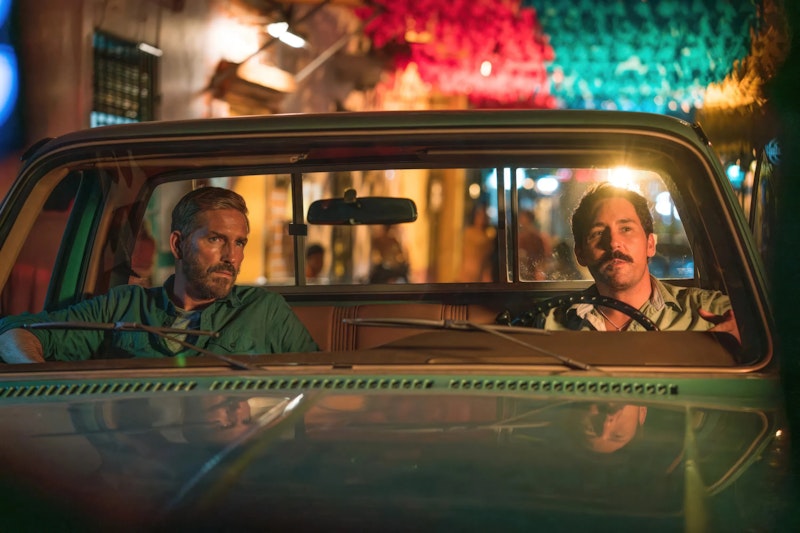When Mel Gibson decided to self-distribute The Passion of the Christ in 2004, he had a little help: Newmarket Films partnered with Gibson’s Icon Productions to bring his biblical epic to as many screens in America as possible. 20th Century Fox passed on the film, wary of pre-release controversy and criticism—so, with the help of Newmarket, Gibson released one of the most profitable films of all time, grossing $612 million against a $30 million budget. Remember, this was a foreign language film with plenty of un-subtitled dialogue, and a level of violence I haven’t seen before or since in a mainstream American film. Kill Bill: Volume 1 only came out four months before, and that was an infectious, exciting, and rejuvenating exercise in movie violence; Kill Bill was as fun and life-affirming as Gibson’s film was miserable. Sitting in a sold-out matinee at The Senator Theatre in Baltimore watching Jim Caviezel as Jesus get his skin whipped off, I was bored and glad I wasn’t raised in a religious family. But my mom and I went like any other weekend at the movies. It was just something to see. I didn’t like The Passion of the Christ, but it didn’t traumatize me, and I knew enough about movies, at least as an avid moviegoer, that this one sort of sucked.
But for all the hubbub around Gibson’s film, liberals didn’t boycott it. The Passion of the Christ was debated and discussed on Charlie Rose, The Today Show, CBS Sunday Morning, and on NPR and in papers like The New York Times and The Washington Post. What’s startling about all this coverage now is how much it belongs to the past—when will the largely liberal media cover a conservative cinematic phenomenon again?
It’s depressing living on the flip side of the 2004 cultural paradigm: later that year, Harvey Weinstein bought Fahrenheit 9/11 back from Disney and made sure it received a wide theatrical release in the summer. I saw it twice that June, both sold-out shows at The Charles, all of the already converted—there were no Republicans checking out Michael Moore’s latest. You can debate the aesthetic merits and moral blurs of The Passion of the Christ and Fahrenheit 9/11, but what’s undeniable was their place in American pop culture, and how our country has completely flipped, and no “respectable” liberal, leftist, or centrist would be caught dead going to go see Alejandro Monteverde’s Sound of Freedom.
Like Gibson and Moore’s 2004 films, the producers of Sound of Freedom reached out to churches and special interest groups to promote the film and plant the seeds for a sleeper hit. This movie came out on July 4, and while there were reports early on of “sold out” screenings with no audience members—auditoriums bought out by distributor Angel Studios and half a dozen private investors—people are still going to see it in the middle of August. You can astroturf a movie into a “hit” like this, but right now, in the middle of August, Sound of Freedom is a genuine sleeper hit, with a $168 million gross against a $14.5 million budget. I saw it with my friend Katherine on Friday afternoon at four, and it was a decent-sized crowd, with plenty of small children (just like The Passion of the Christ). This wasn’t astroturf—we wanted to see what the fuss was about. Besides, the sleeper hit justifies the cinema: a classless, democratic space where a person’s vote—their ticket—counts.
Am I suggesting the 2020 election was rigged? 2016? 2000? Who fucking cares! The fact that I second-guessed the final sentence of the above paragraph is absurd, but I grew up in a world where the people who shut you down, cut you out of their lives, and wished you dead all voted for George W. Bush. They didn’t see Fahrenheit 9/11 because they listened to Rush Limbaugh, just as many of you reading this listen to NPR and would never even consider going to check out the sleeper hit of the summer. Sound of Freedom isn’t particularly good, and it’s just as brutal and unrelenting as The Passion of the Christ, but it’s basically a decent movie, mostly well-made with tolerable digital cinematography that looks better than many other new releases.
What I find so disappointing about all of this is how quickly things changed, and how many otherwise smart people became just as brain-fried, reactionary, and ideologically stuck in the mud as Republicans in the 2000s. I know people who are still terrified of coronavirus and look down on those who stopped “masking” months, if not years ago. They’re the same people who cheer on the violent deaths of Trump supporters, and blindly follow whatever cause célèbre has captured the imagination of protestors in New York City subways. And they’re all too embarrassed to reckon with a movie that millions of Americans have already seen multiple times. I’m not disappointed that Sound of Freedom isn’t that good, I’m depressed that so many people won’t see a movie simply because they’re embarrassed. I mean, what if someone found out? They might think you’re a bad person. And then what? Suicide. Blame yourself. Maybe they’ll forgive you in the hereafter.
I could write about the film’s grim and unforgiving journey into hell, and how its unrelenting brutality with zero catharsis reminded me most of Goodbye Uncle Tom, Cannibal Ferox, and The Passion of the Christ, but why bother? None of you are going to read this part of the article. If you did, you probably already saw Sound of Freedom, and if you liked it, well, good for you. I largely agree with Owen Gleiberman’s review: a benign thriller about a major topic that Hollywood avoids, and shouldn’t. His was one of the only sane reviews from an old guard critic that actually dared to write one.
And for everyone who didn’t read this review after reading the headline, I’ll be praying for you.
—Follow Nicky Smith on Twitter: @nickyotissmith

